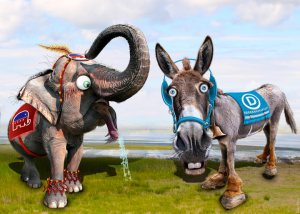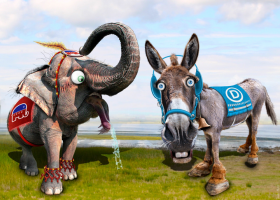
Could Robert Kennedy, Jr. shock President Joe Biden in the New Hampshire primary? Stranger things have happened in American politics.
Don’t look now, but President Biden is still sagging in Democratic Party primary polls, only garnering an average of 35.5 percent in the average of national polls taken compiled by RealClearPolitics.com, as Biden’s official decision to run in 2024 still looms.
Interestingly, almost all of the “candidates” listed on RealClearPolitics.comare not even running, with the standing assumption being that Biden will ultimately seek reelection. Biden rounds out the top of the polls with 35.5 percent, Vice President Kamala Harris (who won’t challenge Biden directly) is at 9.8 percent, Transportation Secretary Pete Buttigieg is at 9.3 percent, Vermont Senator Bernie Sanders is at 8.5 percent, Massachusetts Senator Elizabeth Warren is at 5.3 percent, Hillary Clinton is at 5 percent, New York Congresswoman Alexandra Ocasio-Cortez is at 3.7 percent and California Governor Gavin Newsom is at 3 percent.
And then candidates who are running, like Robert Kennedy, Jr. and Marianne Williamson, are not listed because national polling organizations are largely ignoring their candidacies — perhaps out of fear of promoting any real challenge to the incumbent president.
Until one poll, Morning Consult, crossed the proverbial Rubicon, asking the question among Democratic primary voters on April 7 through April 9, and it shows Biden with seemingly comfortably lead ahead of Kennedy, 70 percent to 10 percent, with Williamson with 4 percent. 8 percent say they want somebody else.
But Biden’s 60-point lead in April is actually down from a 73-point lead in when Morning Consult asked the question March 3 through March 5, with just Williamson in the race, prior to Kennedy entering the race. Afterward, Biden went from 78 percent in the poll to 70 percent in the poll. And the share saying they support somebody besides Biden went from 13 percent to 22 percent — in a month.
That’s bad news. Really, really bad news for Biden.
While incumbent presidents rarely lose to opponents in competitive party primaries at the state level, it can happen. Usually the best place to start looking is New Hampshire — where incumbent presidents tend to go on to become one-term presidents.
1912, 1932, 1952, 1968, 1976, 1980 and 1992 all saw incumbent presidents with significant primary challenges. In every single case, the incumbent president either declined to seek reelection, as with Harry Truman in 1952, who lost the New Hampshire primary, and in 1968, when Lyndon Johnson barely beat Eugene McCarthy and then decided to withdraw from the race altogether.
In other cases, the incumbent president did win their party’s primary or national nominating convention only to go on to be easily defeated, as with William Taft, Herbert Hoover, Gerald Ford, Jimmy Carter and George H.W. Bush. A solid record of defeat for the incumbent party.
In 1980, when Jimmy Carter similarly faced a primary challenge from Ted Kennedy, who ended up winning 12 states, it was absolutely an indicator of how poorly Carter was going to perform in the general election, where Carter lost 44 states in a landslide to Ronald Reagan.
New Hampshire, unlike other primary states, besides holding the distinction as the first in the nation, is an open primary, meaning you can vote in the primary if you are an unaffiliated with either party, that is, you are an independent. When independents in New Hampshire vote for somebody besides the incumbent president in the primary, what it signals is that independents nationally are saying it’s time for a change. Which is why it is so reliable at detecting weakness in incumbent presidents.
For this reason, Democrats in February moved the partisan South Carolina Democratic primary up to the front of the pack to favor Biden, for the first time making it the first in the nation primary — in the hopes of preventing New Hampshire from becoming a self-fulfilling prophecy. But they are misreading what New Hampshire truly represents.
This is a proverbial middle finger to independent voters. Let’s see how that goes. But leaving that aside, Biden has good reason to be worried about New Hampshire. Besides the fact that he lost there in 2020 to Bernie Sanders — it wasn’t even close as Biden didn’t compete there — an Emerson poll in March prior to Kennedy’s entry to the race finds that only 29 percent of New Hampshire Democratic Primary voters want Biden. Sanders is still popular there, garnering 17 percent, Buttigieg is at 14 percent, Warren is at 11 percent, Harris is at 11 percent, Amy Klobuchar is at 7 percent and Gretchen Whitmer is at 4 percent—none of whom even appear to be running.
How will it look when the poll starts actually asking about real candidates like Kennedy? The truth is, Biden doesn’t even need to lose in New Hampshire. The question of an incumbent’s weakness with independents comes into play merely if the president simply does poorly in the primary. Both Jimmy Carter and George H.W. Bush won in New Hampshire in 1980and 1992, respectively, but their challengers, Ted Kennedy and Patrick Buchanan, did surprisingly well, garnering 37 percent apiece.
In 2020, skipping New Hampshire made a great deal of political sense for Biden, who went on to win the nomination relatively easily after solidly defeating Sanders in South Carolina. But it’s different now. He’s the President of the United States. He doesn’t need to worry about losing his party’s nomination — presidents in modern history are usually easily renominated — he needs to worry about the general election.
And what New Hampshire does is test incumbents for weakness. And with sticky 5 percent inflation and the Federal Reserve projecting unemployment to rise to 4.6 percent in 2024 as inflation is now falling — as many as 2 million jobs could be lost in what is purported to be an imminent recession — Biden is absolutely vulnerable to a challenge in the general election by Republicans, with former President Donald Trump running for a third time and leading the GOP polls.
That could mean there’s going to be a Biden-Trump rematch, but a better question might be whether Biden even gets to the general election. Stay tuned.
Robert Romano is the Vice President of Public Policy at Americans for Limited Government Foundation.
To view online: https://dailytorch.com/2023/04/biden-still-sagging-in-democratic-primary-as-2024-decision-looms-kennedy-up-to-10-percent-poll-shows/
